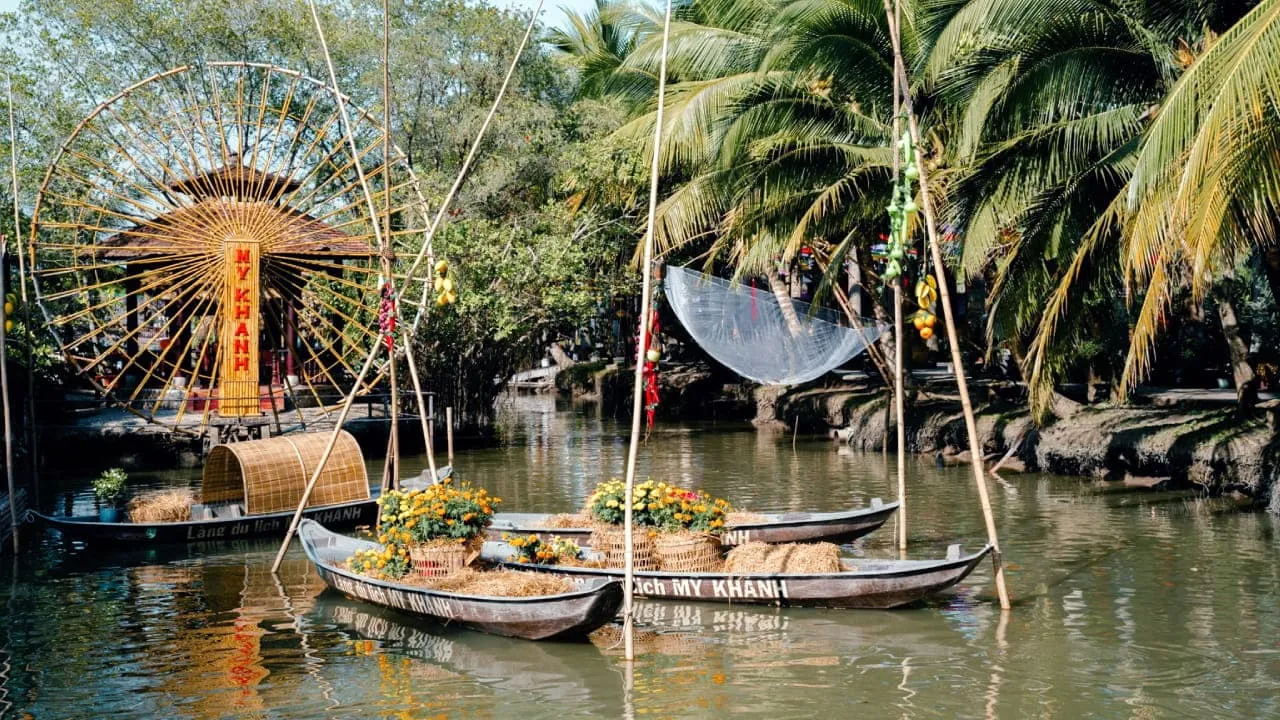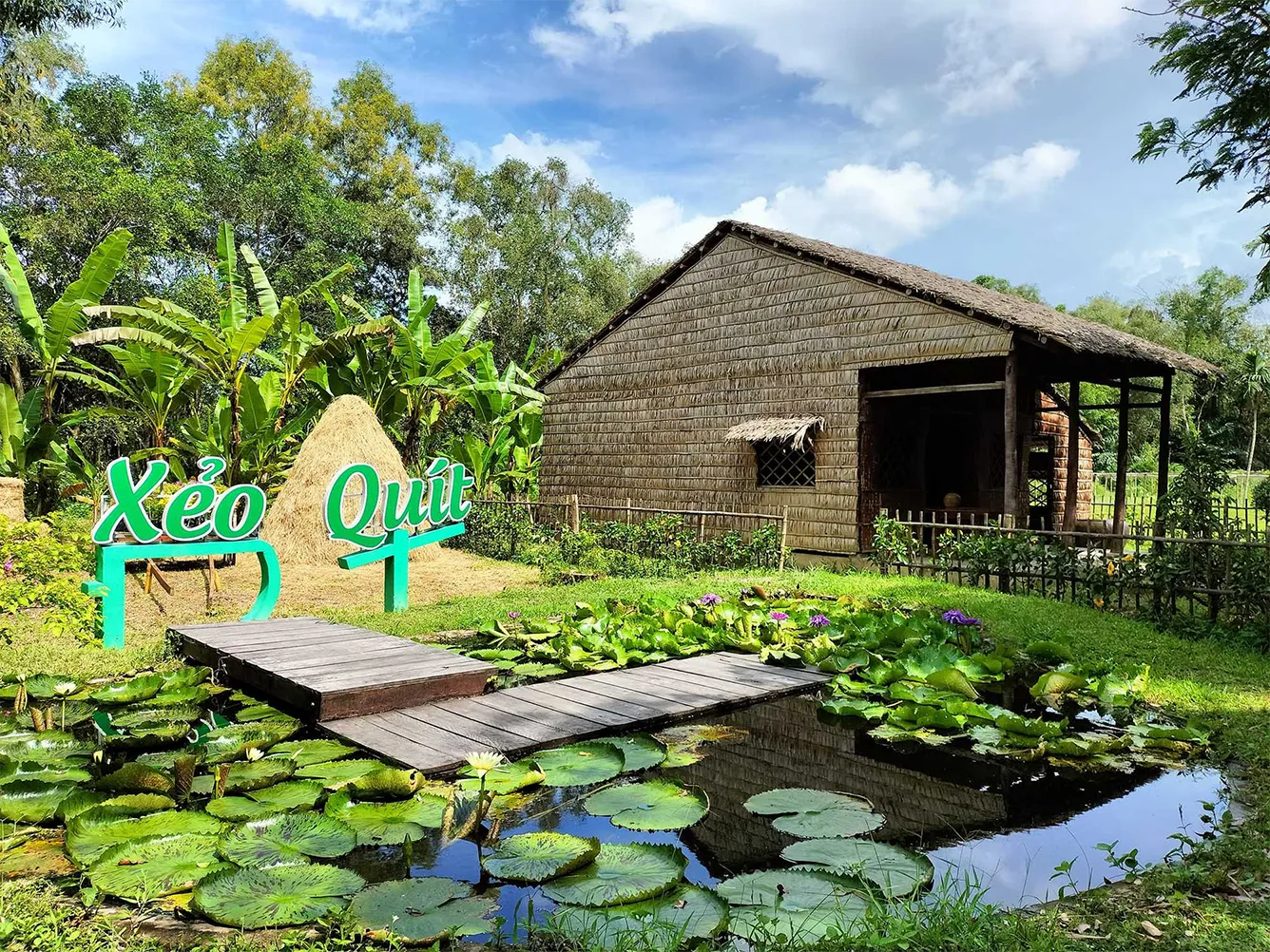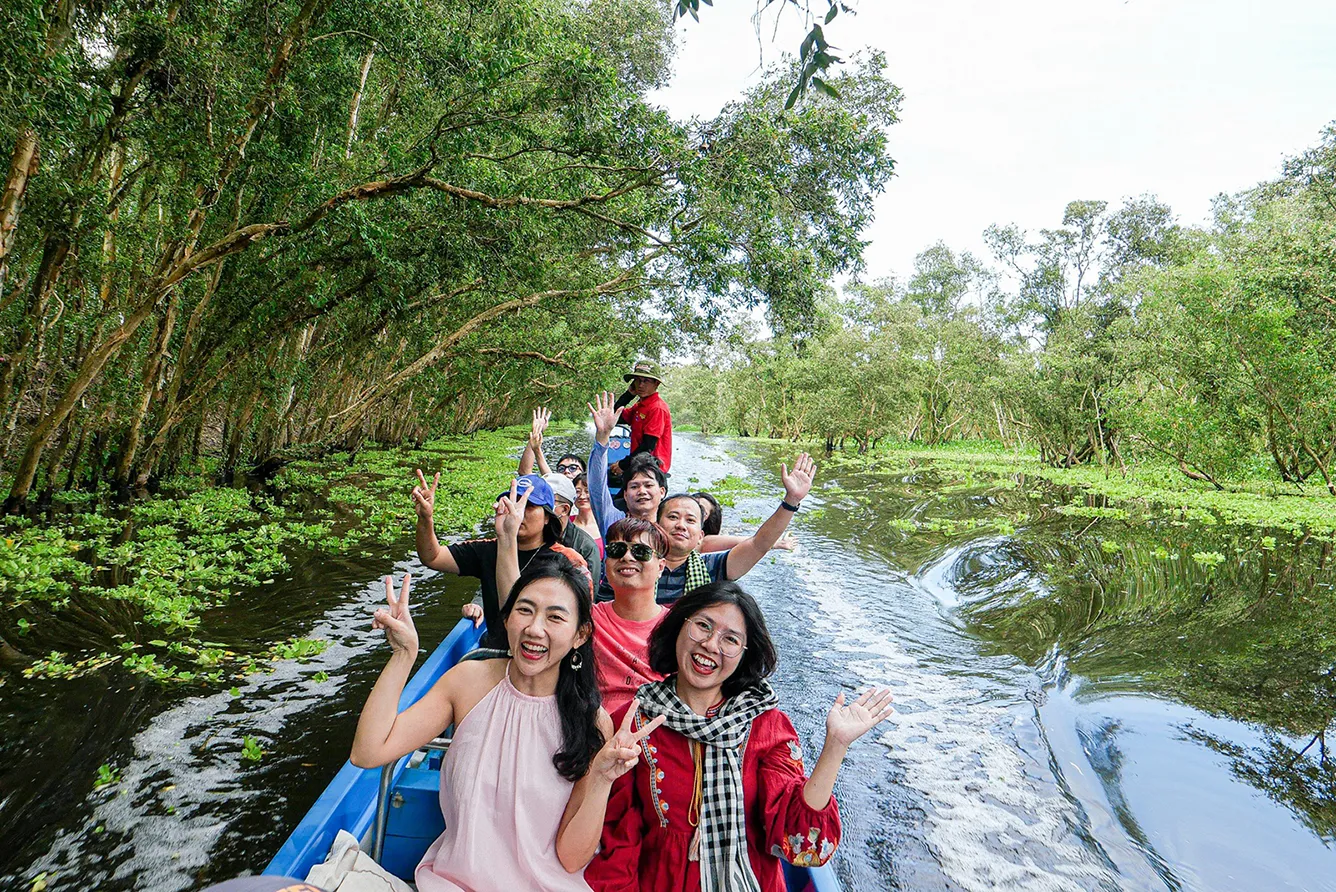The Mekong Delta, a fertile region blessed with diverse ecosystems and rustic beauty, has always been an attractive destination for both domestic and international tourists. Beyond its famous sweet fruit orchards, bustling floating markets, and vast rice paddies, the Mekong Delta captivates visitors with its unique ecotourism areas. These are places where people can immerse themselves in nature, experience distinctive cultural features, and enjoy tranquility. If you are seeking refreshing green getaways to escape the city’s hustle and bustle, join “Du lịch khắp thế gian” to explore the most wonderful ecotourism destinations in the Mekong Delta, promising unforgettable experiences.
Con Phung Islet Ecotourism Area – Returning to the Auspicious Land of Ben Tre
Con Phung Islet, a green pearl in the heart of the Tien River, located in Ben Tre province, is one of the most famous ecotourism areas in the Mekong Delta. Formed from annual alluvial deposition, Con Phung Islet boasts rich natural beauty with lush fruit orchards, intricate canals, and green space covering everywhere. Visiting Con Phung Islet is like stepping into another world, completely separate from the daily hectic pace of life.
Here, you can freely explore activities imbued with the essence of the Mekong Delta’s riverine countryside. Challenge yourself with thrilling crocodile fishing, practice your dexterity walking on wobbly monkey bridges, or relax strolling through fruit-laden orchards, enjoying the sweet taste of fresh fruits right in the garden. In particular, Con Phung Islet is also a place to preserve and promote the traditional cultural values of the Mekong Delta. You will have the opportunity to enjoy “Đờn ca tài tử” – a unique art form recognized by UNESCO as an intangible cultural heritage of humanity.
Con Phung’s cuisine is also a highlight not to be missed. Rustic dishes, rich in Mekong Delta flavors, such as crispy fried elephant ear fish, delicious bánh xèo (sizzling crepe), or greasy and flavorful fried coconut weevil, are sure to satisfy every diner. Con Phung Islet is not only an attractive ecotourism destination but also a place for you to learn about the culture and people of the Mekong Delta and enjoy wonderful relaxing moments with family and friends.

My Khanh Tourist Village – Essence of Garden Culture in Can Tho
Located about 10km from the center of Can Tho city, My Khanh Tourist Village appears as a miniature painting of the Mekong Delta countryside. This place is known as the “essence of garden culture” due to the harmonious combination of green natural space and the unique cultural features of the Western Capital (Tây Đô) region. Coming to My Khanh, visitors will experience a simple rural life, participate in folk activities, and discover unique traditional cultural values.
My Khanh Tourist Village is famous for its lush fruit orchards, laden with fruit all year round. Visitors can freely stroll under shady trees, admire specialty fruits of the Mekong Delta such as rambutan, mangosteen, durian, and enjoy their sweet and fresh taste. Besides, My Khanh also offers interesting experiences such as “A Day as a Landowner,” helping visitors transform into real farmers, participating in farming activities such as planting, harvesting, and tending plants. Or you can also try your hand at the exciting “Ditch-fishing” activity, catching snakehead fish and catfish in the ditch together and enjoying the fruits of your labor.
Moreover, My Khanh Tourist Village is also a place to preserve and introduce the traditional culture of the Mekong Delta. Visitors can visit ancient Southern houses, learn about the architecture and lifestyle of ancient people, enjoy sweet and deep “Đờn ca tài tử” melodies, or immerse themselves in the joyful atmosphere of folk games such as pig racing, dog racing, and monkey circus. My Khanh is truly an ideal destination for you to explore and experience Mekong Delta culture in the most complete way.
Tan Lap Floating Village – Discovering the Beauty of Tram Chim National Park in Long An
Tan Lap Floating Village, located in Long An province, is a new and attractive destination on the Mekong Delta ecotourism map. With its pristine, peaceful natural scenery and unique cajuput forest ecosystem, Tan Lap offers visitors wonderful nature exploration and relaxation experiences. Coming to Tan Lap Floating Village, you will immerse yourself in the green space of the cajuput forest, explore trails through the forest, and admire the beauty of brilliant lotus and water lily fields.
The highlight of Tan Lap Floating Village is the 5km-long cajuput forest trail, made of concrete and winding gently among the green cajuput trees. Walking on this path, visitors will feel the peace and tranquility of nature, listen to the melodious birdsong, and breathe in the fresh, cool air. From the 38m-high observation tower, you can zoom out to see the entire vast cajuput forest, admire the majestic beauty of nature, and enjoy the cool breezes.
In the flood season, Tan Lap Floating Village becomes even more attractive. Lotus and water lily fields bloom, showing off their vibrant colors on the water surface, creating a poetic and romantic scene. Visitors can rent a boat to weave through the lotus ponds, admire the flowers and take souvenir photos, or experience kayaking to explore the cajuput forest. Tan Lap Floating Village is an ideal destination for those who want to seek peace, relaxation, and immerse themselves in the pristine nature of the Mekong Delta.
Xeo Quyt Ecotourism Area – Visiting the Old War Zone in Dong Thap
Xeo Quyt Ecotourism Area, located about 30km from Cao Lanh city (Dong Thap), is a unique ecological area with 20 hectares of primeval cajuput forest. This place is not only famous for its pristine natural beauty and diverse ecosystem but also an important historical relic, associated with the heroic years of resistance of the nation. Coming to Xeo Quyt, visitors will explore the cajuput forest by sampan, visit the war zone relics, and enjoy rustic countryside dishes typical of the Mekong Delta.
Sitting on a small, lovely sampan, weaving through small canals, with rows of green cajuput trees on both sides, cajuput roots hanging down to the water surface, creating a magical and poetic scene. Visitors will explore the diverse cajuput forest ecosystem with many rare bird species, wild animals, and rich vegetation. Xeo Quyt is also a place to preserve historical traces of the old war zone. You can visit the Z-shaped bomb shelter, combat fortifications, revolutionary cadres’ working houses, and learn about the heroic historical stories of this land.
After exploring the cajuput forest and war zone relics, visitors can stop at Xeo Quyt restaurant to enjoy special countryside dishes such as fragrant grilled snakehead fish, refreshing sour soup with sesbania sesban flowers, and rich and flavorful fermented fish hotpot (lẩu mắm). Xeo Quyt is not only an attractive ecotourism destination but also a meaningful historical tourist site, helping visitors understand more about the nation’s heroic past and cherish the values of peace today.

Tan Quy Islet – Sweet Fruit Garden of Tra Vinh
Tan Quy Islet, belonging to Cau Ke district, Tra Vinh province, is an attractive ecotourism destination with rich natural beauty and specialty fruit orchards. This place is famous for its delicious mangosteen orchards, gentle canals, and peaceful, quiet space. Coming to Tan Quy Islet, visitors will immerse themselves in garden life, enjoy fresh fruits, and experience the unique cultural features of Tra Vinh land.
Tan Quy Islet is known as the “kingdom of mangosteen” because it has vast mangosteen orchards, laden with fruit. Tan Quy mangosteen is famous for its delicious, sweet, and juicy taste. Visitors can come to the islet during mangosteen season (around May to July of the lunar calendar) to enjoy fresh fruits in the garden, buy them as gifts, and learn about the process of growing and caring for mangosteen. In addition to mangosteen, Tan Quy Islet also has many other specialty fruits such as rambutan, durian, longan, jackfruit, creating a diverse and rich fruit garden.
Not only does it have delicious fruits, Tan Quy Islet also attracts visitors with Mekong Delta specialty dishes such as hotpot with sesbania sesban flowers and fish, hotpot with chicken and Giang leaves, and mangosteen chicken salad. In particular, on the occasion of Doan Ngo Tet (Double Fifth Festival), Tan Quy Islet also organizes the traditional Vu Lan festival, attracting many tourists to visit and experience. In the dry season, Tan Quy Islet also has natural beaches where visitors can freely play and enjoy the cool water. Tan Quy Islet is an ideal destination for those who love to explore natural beauty and enjoy Mekong Delta specialties.
Tra Su Cajuput Forest – Exploring the An Giang Ecosystem
Tra Su Cajuput Forest, located about 30km from Chau Doc city (An Giang), is one of the most famous and beautiful ecotourism areas in the Mekong Delta. With an area of nearly 850 hectares, Tra Su Cajuput Forest is a typical flooded ecosystem of the Mekong Delta, home to hundreds of species of rare birds, animals, and plants. Coming to Tra Su Cajuput Forest, visitors will take a boat to explore the cajuput forest, admire the pristine natural scenery, and enjoy specialty dishes of An Giang land.
The special feature of Tra Su Cajuput Forest is the western water hyacinth covering the water surface, creating an endless green color. Sitting on a composite boat, weaving through the water hyacinth, visitors will feel the peace and tranquility of the cajuput forest and admire flocks of birds flying in the sky. Tra Su Cajuput Forest is home to more than 70 species of birds, including many rare species such as the Indian spot-billed pelican, gray heron, and great cormorant. In the breeding season (around July to October of the lunar calendar), Tra Su Cajuput Forest becomes busier and more vibrant than ever with birdsong echoing everywhere.
In addition to exploring the cajuput forest ecosystem, visitors can also enjoy An Giang specialty dishes at the restaurant in the tourist area such as grilled snakehead fish wrapped in straw, sour soup with sesbania sesban flowers and linh fish, and fermented fish hotpot (lẩu mắm). Tra Su Cajuput Forest is not only an attractive ecotourism destination but also an important nature reserve, contributing to environmental protection and biodiversity of the Mekong Delta.

The Mekong Delta, with its rich natural beauty and unique ecotourism areas, is always an ideal destination for those seeking peace, relaxation, and exploring the unique cultural features of the riverine region. The ecotourism areas in the Mekong Delta not only offer visitors experiences close to nature but are also opportunities to learn about the culture, history, and hospitable, genuine people of the Mekong Delta. Come and feel the poetic beauty of the Mekong Delta, you will surely have unforgettable memories in your journey to explore this land.